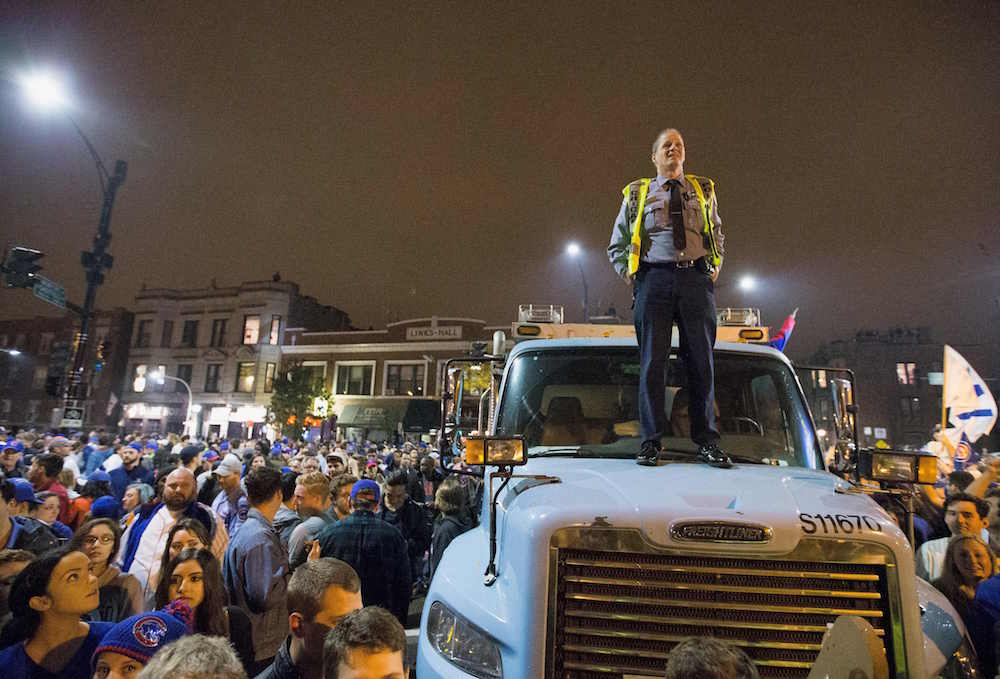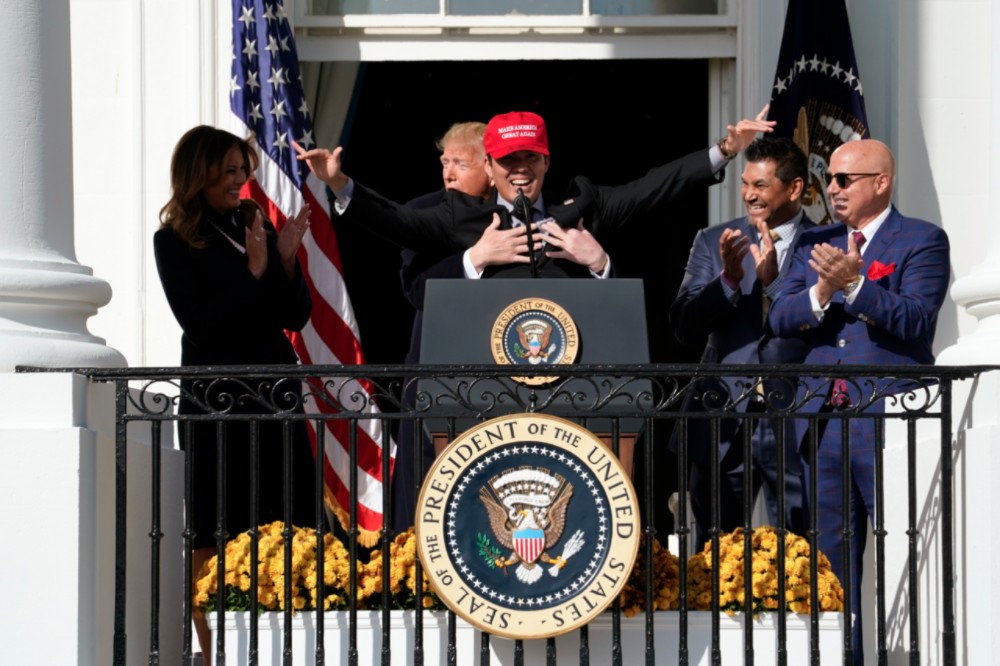When the Cubs won the World Series after an insane, nerve-wracking game—predicted by a random fan in 2014, less likely than a Trump presidency according to Nate Silver, crystallized as the ultimate impossibility in a Mountain Goats song—my cousin, his wife, and I left their Lakeview apartment, made our way outside to Clark and pushed uptown toward Wrigley Field, along the crowds in their jerseys, waving flags and high-fiving anyone in sight. A symphony of car horns filled the air, which smelled of cheap beer. The massed fans moved so uniformly up the street, overflowing the sidewalks into streets where no cars dared drive. The vibe was gleeful—drum circles filled with dancers, babies held with one arm, men standing on street signs and whooping it up. A guy flying a drone, for some reason. One of the regrets of my life is I wasn’t at home in Chicago when Obama won in 2008, but I imagine it was a similar scene—a communal buzzing, the happiness diffused across hundreds.
Being a Cubs fan is no more significant than being a fan of any other team, in that sports provide a convenient means of civic engagement that’s baked into into a city’s citizens from the start. (Or not—plenty of people don’t care about sports, and are healthier for it.) Whether they’re the most beloved team of Chicago is up for debate—they’re hated by a chunk of the South Side, who support the White Sox, at least—but they’ve been around the longest, allowing the futility of their winless streak to linger like a bad hangover. 108 years had passed since the Cubs had won the World Series; 108 years of fans waiting patiently, and dying before it could happen. They wrote the names of the departed on the stadium; they drove hundreds of miles across the country to listen to the game on a radio, in a cemetery, just to fulfill long-remembered promises.
We walked past the parts of Lakeview where I spent much of my teenaged years, though they’d changed since my departure. The Dunkin Donuts at Clark and Belmont had been torn down and replaced with a generic condominium complex, depleting the character of the corner. The Alley, a market hub for punks and goths hoping to buy their first studded belts, was now shuttered as an empty storefront. My cousin pointed it out and said that, as a kid from outside the city, he’d seen the Alley as an emblem of everything the suburbs weren’t–he marveled that he’d moved just a few blocks away as an adult. The symbolism was obvious and maudlin—a closed loop between then and now, between punk dreams and adult realities, between Cubs fans dead and living, but I was too aglow to be cynical.
As we walked further up Clark toward Wrigley, which would’ve taken a brisk 20 minutes on an empty night, the traffic thickened. At Sheffield, a north-south street that forms the border of what’s typically considered Wrigleyville, the stream of people came to a complete stop as we ran into a wall of flags, of trucks arranged in a line across the street with cops standing on top, beckoning us to push west or go home. Here, my cousin and his wife turned back, their curiosity deflated by the prospect of banged shoulders, muddied shoes. In the cloistered quarters, the fear of a riot—the much-loved process of rowdy young men fired up after a big sports win—seemed justified; a series of hard shovings would’ve been enough to spark something disastrous.
I spotted an alley where people were walking uptown, and squeezed my way through the cigar smoke, the couples taking selfies or arguing. A truck filled the alley, but instead of cops on top, there was a marauding horde of drunks in jerseys, posing under the lights for the passing cameras. I watched them before I realized someone was trying to climb from the truck onto a nearby telephone pole, and left before I could be complicit in the sure-to-be accident.
By the time I got to Wrigleyville–Bourbon Street for every smart-enough suburban white kid who ever yukked it up in a high school class–it was thrumming with drunken delirium. A shirtless man with a shortstop’s physique hefted himself onto a friend’s shoulders, and led the crowd in a rousing rendition of “Take Me Out to the Ball Game.” There was that, and “We Are the Champions,” and “Staying Alive,” and “Go Cubs Go,” which I heard from every other corner as I walked through the city. At one point I tripped, looked down, and saw a single right shoe dislodged from his owner, pasted to the ground.
https://www.youtube.com/watch?v=aQBAtkO3LdQ
In the distance, Wrigley Field loomed, the facade already edited to blare WORLD SERIES CHAMPIONS in LED lights. In my head, I’d imagined a scene where I could, I don’t know, fall on my knees at the stadium, say a prayer for the dead members of my family who’d come to Cubs games hoping for something good to happen and had left unfulfilled, shed a single tear, and say another prayer to be finally done with sports forever, but the idea seemed impossible (and at the very least melodramatic) as the reality of the traffic jam sank in. Instead, I spun around and tried to take a selfie, impossible as my shoes were stepped on and my shoulders bumped by the palpably drunken crowd. Next to a guy blowing billowing plumes of coconut-filled vapor, a pair of jersied goofs shook up bottles of champagne, sprayed them all over.
Meanwhile, police scanners reported smashed cars, bar fights, broken windows, the masses liquored and unruly and ready to whip an axe into a cop car. Absurdly, one report claimed an electric pole was ripped out of the ground and carried down the street, live wires and all. I didn’t see any of this, even from my proximity to the action—the crowds were so dense, the noise was so evenly spread, only a helicopter or singalong could re-centralize everyone’s attentions. Were the police keeping the peace? The cops I saw, deployed by the hundreds, were smiling, same for the FBI deployment in their camo-colored kevlar and assault rifles. They were enjoying the moment, presumably, and reveling in their ability to deal with a bunch of sauced whites. (“Get rid of the beer,” I overheard one cop say to a fratty fellow; “Yes, sir” was the immediate response.)
I wanted to avoid the riot, I admit. After an hour, spent in the center of the pushing bodies, I decided to walk the long road home, thinking about what the win meant. Probably not much; it was still sports, which meant it could only make us feel good or bad. The negative outcomes were easier to foresee: the Ricketts family funneling the ad revenue into more anti-Hillary ads, or holding up the city for tax money to rehabilitate the stadium. Maybe the police scanner would pick up a more nefarious act of violence, though when the night passed, it seemed we’d lucked out. (There were other reports of non-Cubs violence, a reminder that for some of the city’s celebration, Chicago is not a monolith.)
On that walk home, weary yet exhilarated at 2 a.m., a stranger asked if I liked tequila, and offered the bottle for me to take a plug. It didn’t presage any kind of unity, or brotherhood, or moral lesson about waiting it out for 108 years–but the taste and flicker of light-headedness was its own reward.





